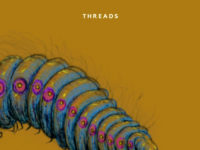During the 1970s when a lot of rock-jazz fusion bands sprung up, four musicians from Switzerland came up with their own, singular take on the hybrid. Saxophonist Urs Leimgruber, electric guitarist Christy Doran, acoustic bassist Bobby Burri and drummer Fredy Studer named their band after John Coltrane’s 1965 frantic exercise Om, and this OM sought to bring aggressive free jazz to rock, pushing much further out than most of their contemporaries. Convened in 1972, the quartet made records made records for ECM’s JAPO imprint in the late ’70s and then called it a day in 1982. Eventually, they regrouped in the 2000s and a 2008 festival date at Willisau produced a live document from Intakt. A decade later, OM returns with a studio release.
It’s About Time, therefore, is OM”s first non-live album since 1980. Yes, it’s about time. The faces are the same, the instruments are the same, and you can still trace the lineage of their music back to the Coltrane’s Pharaoh Sanders period and the molten, unbound guitar-centric rock of Jimi Hendrix. The twenty-first century version of OM updates and expands their sound made possible by electronics and perhaps a wider range of percussion from Studer. If anything, OM is even less inhibited than they were during the 70s.
Impulse still reigns supreme but it’s the synergism that really makes the plot, highlighting sharp contrasts in sounds or making uncanny resemblances of sound from different instruments. Deft use of electronic alterations make it hard to trace the source of sounds on “Covid-19 Blues,” they all just blend in together to form a strange brew of noise. Much of “Like a Lake” is dispersed, the bass and drums settling into a groove about four minutes in. Doran and Leimgruber converse freely in higher pitches, dug into the opposite end of the tonal spectrum from the steady march of Burri and Studer.
When “Perpetual-Motion Food” gets into gear with a single-note stomp that resembles the intro to Hendrix’s “Purple Haze,” it’s a set up not for heavy blues but rather for Leimgruber’s unshackled soprano sax run, and it’s not long before Doran and the rest coalesce around that. When he recedes, we find Burri’s original threatening bass crawl is still with us, forming a springboard once again but with Doran going on flights of fancy.
“Fragments” flies out of the chute blasting notes like artillery, then Burri peppering the landscape with unnaturally high tones. In another segment, Leimgruber is lobbing more haymakers. “Nowhere” is a respite from the raw fury, baring further OM’s interest in uncovering uncommon tonalities such as the distant wind phenomenon they create using scrapes of strings, the brushing of cymbals and labored puffs on a reed amid the barely perceptible swirl of electronics.
There are other examples where they slyly coax modulations together to come up with strange brews. The soprano saxophone is an instrument known for high timbres, but Leimgruber is able to achieve baritone-low tones from it on “String Holder” that are virtually indistinguishable from Burri’s bass, and goes way up to top of the soprano’s upper register. “On a Bare Branch” is a bare song indeed, full of high-register creaks coming from all directions but eventually, Leimgruber’s urgent sax comes to the fore.
Though OM’s bag of tricks is deep, they make it all work because that know each other so well. “It’s About Time” is set on a single chord but full of intrigue with Burri on bowed bass but settles into a groove about 4 minutes in where Leimgruber and Doran battle it out, with Burri and Studer so responsive to subtle adjustments in the flow.
If OM had just materialized in the present day, it would be easy to place them on the forefront of improvised music. They were first doing this almost 50 years ago, however, and today they are doing it as well as they’ve ever done it. Turns out, some of the old guys are still leading the way into the future of jazz.
It’s About Time is now out, courtesy of Intakt Records.
- Christian Marien Quartett – ‘How Long Is Now’ (2024) - April 18, 2024
- Dave Douglas, feat. James Brandon Lewis – ‘Gifts’ (2024) - April 11, 2024
- Thollem – ‘Worlds In A Life, Two’ (2024) - April 8, 2024




